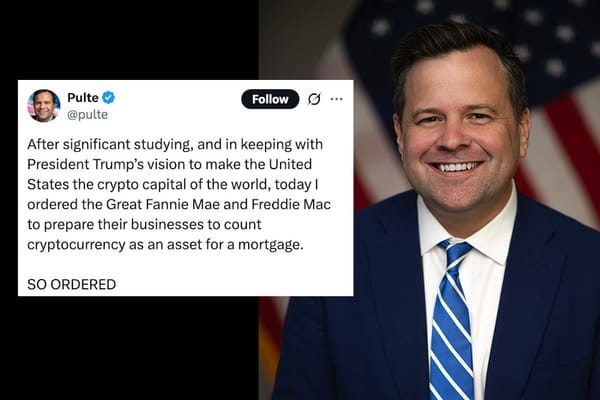Cryptocurrency companies have raised over $135 million to influence US elections this cycle, and they’re just getting started
As election season kicks into high gear, we need to watch how cryptocurrency companies are influencing US politics.
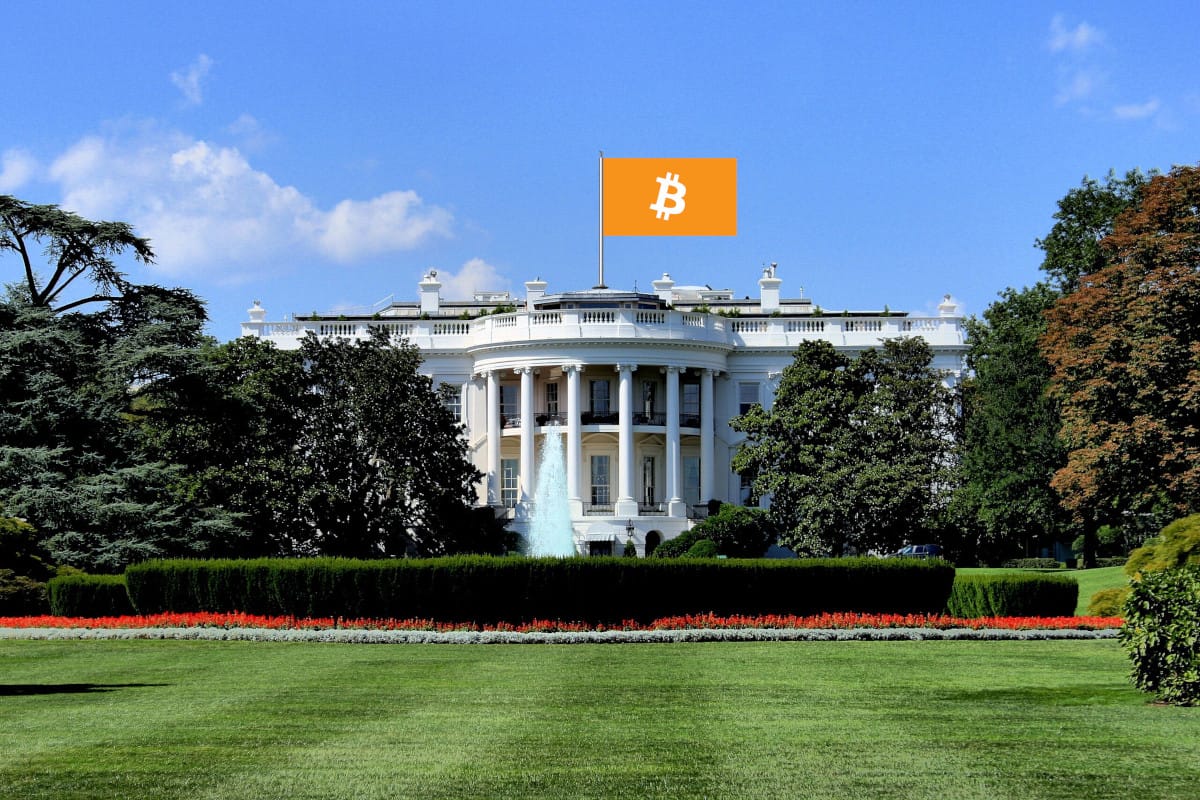

I am worried about cryptocurrency’s impact on the upcoming elections in the United States, but not in the way the industry would like you to think.
Recently, there has been a push by the cryptocurrency industry to portray crypto as a major issue that will influence votes in the upcoming election season. This just so happens to coincide with Donald Trump's recent statements suggesting he's warmed to the industry. Although Trump personally has actually been far more vocally anti-crypto than Joe Biden — in 2021 saying bitcoin “just seems like a scam”1 and reportedly ordering Treasury Secretary Steve Mnuchin to “go after bitcoin” in 20182 — that hasn’t stopped many in the cryptocurrency world from embracing him as the supposedly pro-crypto candidate anyway.a
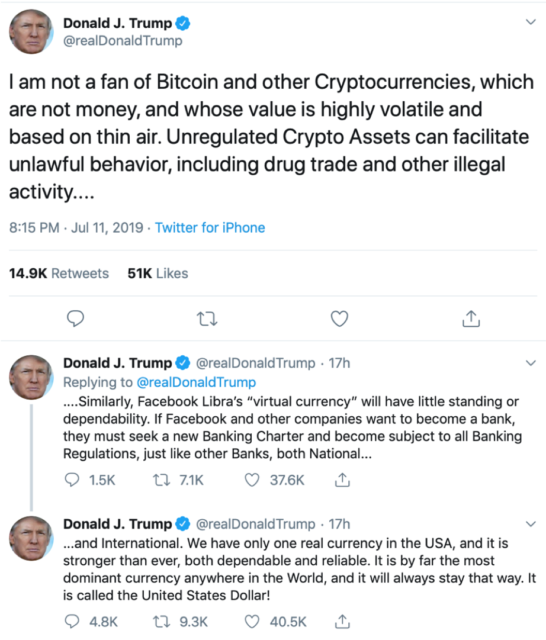
It's not entirely clear why Trump has done a U-turn. Perhaps it's simply because supporting crypto has become the Republican thing to do. Perhaps it was because he himself discovered the grift potential this industry unlocks when released his own set of NFTs in 2022 [W3IGG].
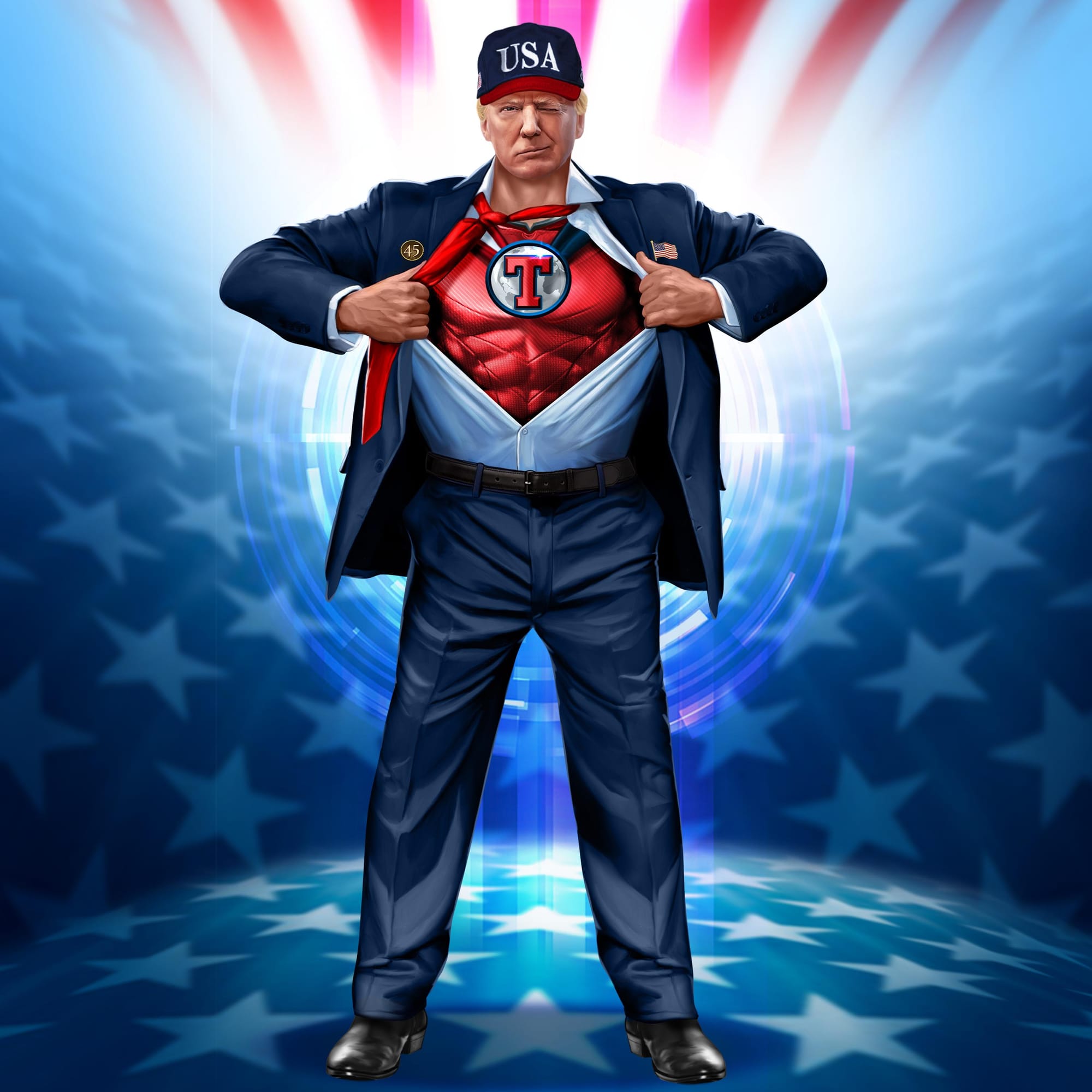
Either way, in a span mere months, he’s gone from a rather dispassionate “I can live with it” in February to much more emphatically telling a press pool a few weeks ago, from behind a podium emblazoned with the name of his NFT collection, that “I’m good with crypto” and “If you're for crypto you better vote for Trump”.
:format(jpg)/cloudfront-us-east-1.images.arcpublishing.com/coindesk/AWJT3PJJKVGGPKPNXZGXV2OIOY.jpg)
When pressed for specifics, his responses have been flimsy, suggesting he is merely saying what people want to hear on the campaign trail.3
Another possible explanation for his sudden shift could be the cryptocurrency industry’s hard work urging political candidates on both sides of the aisle to embrace cryptocurrency by suggesting it is now a major election issue, particularly when it comes to younger voters or people of color.b One notable recent example is a survey funded by the Digital Currency Group and published by the crypto lobbying group The Blockchain Association,c4 which elicited uncritical headlines such as Politico’s “Crypto is Trump's new weapon against Biden”5 — despite finding that a whopping 80% of respondents disagreed (50% strongly) with the statement that “Crypto is a major issue I’m considering during the next election".
In reality, their poll of 1,201 American voters in six swing states is a masterclass in spin. 69% of the people surveyed had “very” or “somewhat” negative opinions towards crypto, but DCG is crowing that “Among a sizeable contingent of voters, crypto attracts a level of interest that translates into pro-crypto sentiments across the board” and advising political candidates to adopt pro-crypto stances to attract voters. Many of the questions were framed ambiguously — such as the “Crypto is a major issue I’m considering during the next election” one — which allowed DCG to put “21% agree” in big letters while obfuscating the fact that those who agreed were not necessarily crypto supporters. In fact, if you do the math, more than 100 of the 252 people (~40%) who said they felt crypto was a major issue in upcoming elections do not feel positively towards crypto — in other words, there's a contingent of fellow skeptics among that 21%, who are likely hoping for candidates who might support more aggressive approaches against the industry.
I've pulled the available data from the agree/disagree questions in the DCG survey to present it a bit more concisely and without their editorializing, which I think illustrates both the ambiguity of many of the questions and a much more muted response to their questions than their report's "conclusions" section would suggest:
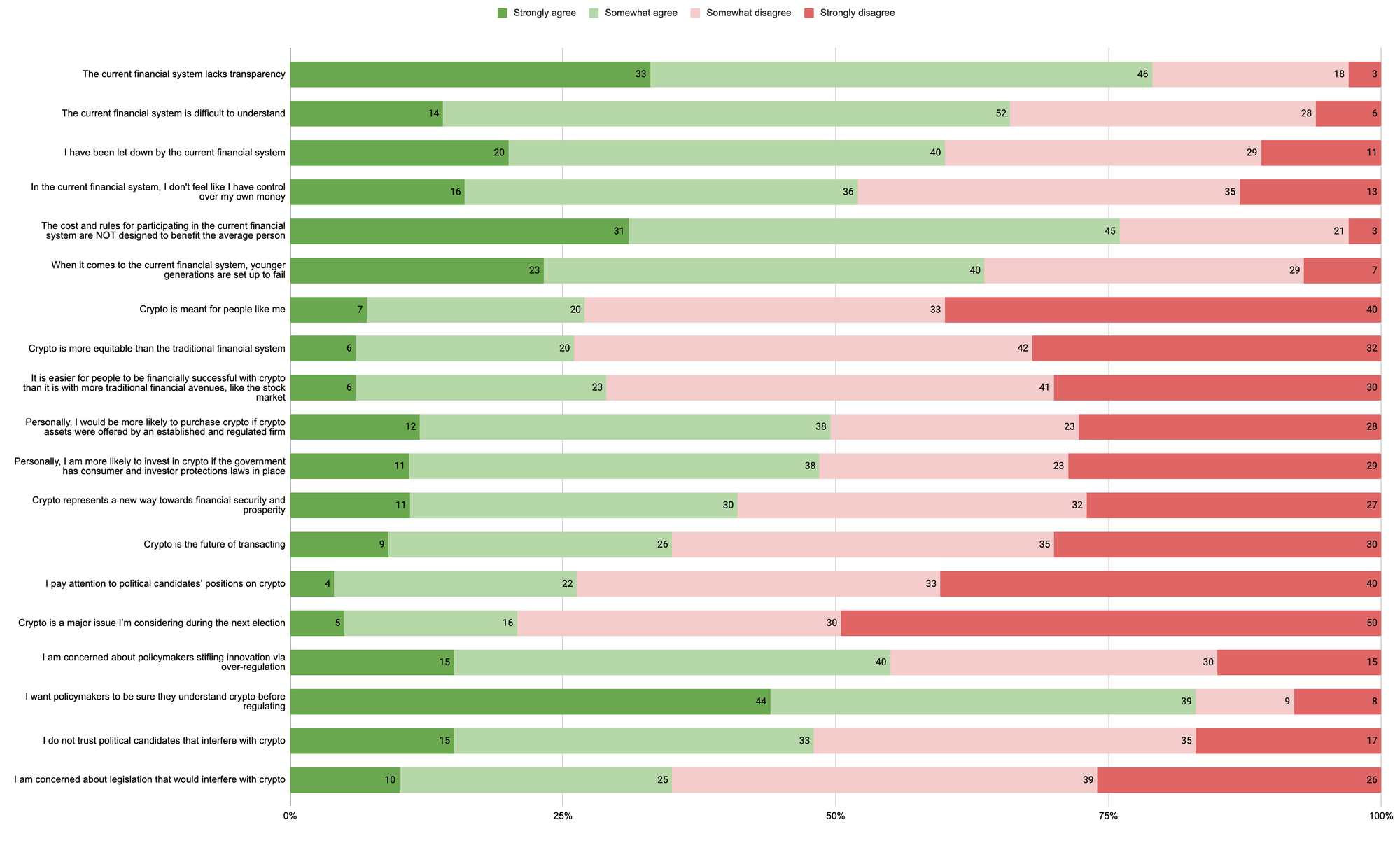
Frankly, it just doesn't seem likely to me that a substantial number of people are single-issue crypto voters and would be swayed to vote for a candidate they might not otherwise support because of it. Many of the people celebrating Trump's recent crypto U-turn were probably already planning to vote for him, and I doubt there were many crypto-skeptical people out there previously who didn't otherwise support Trump, but who intended to vote for him because of his former position on the industry.
When it comes down to it, Americans tend to care more about the typical election issues — strengthening the economy,d other economic issues like high food prices and cost of living, healthcare, education, crime, the environment — than about their crypto holdings.67 Crypto advocates argue that people who have much of their net worth in crypto aren’t likely to vote for candidates who threaten those holdings, which may be true,e except they seem to forget that outside of Crypto Twitter, this is likely an incredibly small portion of the population.f
Regardless of what crypto lobbyists and the companies paying for these polls might like you to think — or, more precisely, what they would like the politicians willing to adopt new policy positions to woo more voters to think — it's not the opinions of the general voting public that has me worried.
I'm worried about the money.
The cryptocurrency industry has been throwing money into politics unlike ever before, and that’s even after political donations from the industry skyrocketed in 2022. The super PACs they're backing have raised more than $137 million already. Over $117 million of that has been raised by Fairshake, a super PAC funded by Coinbase, Ripple, Jump Crypto, Circle, Kraken, and others.8 That amount puts Fairshake at #3 on OpenSecrets’ list of super PACs by amount raised, following just behind the Senate Majority PAC at #2, and Ron DeSantis’ Never Back Down PAC at #1.9 Two other cryptocurrency-focused super PACs, the conservative “Defend American Jobs” and liberal “Protect Progress”, have raised roughly another combined $10 million — both funded by nearly identical donations from Coinbase, Ripple, and Andreessen Horowitz.1011 As noted in a report by Public Citizen, much of this money is coming from the companies directly, taking advantage of the Citizens United decision to enable unlimited corporate political spending.12
And that's not all. Coinbase, which created its “Stand With Crypto” advocacy group last year, is now organizing a PAC of the same name (of the non-super variety), where they will encourage their customers and others in the industry to donate. They claim they’ve already raised over $87 million.g
Coinbase, and affiliated people like CEO Brian Armstrong, have poured so much money into politics this cycle — almost $27 million to date — that they have landed at #7 on the list of organizations by political contributions to outside spending groups.13 Until today, Ripple wasn’t far behind, in 9th place with almost $25 million contributed. However, their announcement today of a new $25 million infusion to the Fairshake PAC14 should put Ripple at #5 on the list, with around $50 million spent in total.h
Most of the money hoarded in that crypto war chest has not yet been spent. Of the roughly $25 million that has, over $20 million has gone towards supporting Republicans or opposing Democrats. A sizable portion of that was the roughly $10 million spent by Fairshake, mostly on attack ads that didn't mention cryptocurrency, to oppose Democratic California Senate candidate Katie Porter. As I wrote previously:
The ad attacks Porter for receiving three contributions of $500, $2,000, and $2,900 from individuals who are executives at a pharmaceutical company, oil company, and bank (respectively), and claim she has received more than $100,000 in such contributions from “Big Pharma, Big Oil, and the Big Bank executives”. The irony of Big Crypto spending 20× this amount on an attack ad is, apparently, lost on them.
Porter ultimately lost her race for one of two primary seats to Democrat Adam Schiff and Republican Steve Garvey. While Coinbase's Stand With Crypto advocacy group had given Katie Porter an F (“strongly against”) rating on cryptocurrencies after she co-signed a letter by Elizabeth Warren inquiring about the impact of cryptocurrency miners on Texas’ electrical grid,15 Schiff was blessed with a B (“supportive”) rating after he “completed the Stand With Crypto Questionnaire and demonstrated support for crypto and digital assets”.16 Garvey is, as of writing, unrated on their website.17
The super PACs' mundane names and the conspicuous absence of any mention of cryptocurrency, technology, or technology regulation in many of their advertisements thus far bely the industry’s claims that there is a substantial sector of crypto voters just waiting to be mobilized. Instead, it points to their more sinister belief that elections — and by extension, favorable regulations — are merely there for the buying. Though many are more coy about it, Coinbase CEO Brian Armstrong has said it himself:
Money moves the needle... For better or worse, that's how our system works.– Coinbase CEO Brian Armstrong18
I have been working as hard as I can, and as quickly as I can, on a project to try to track cryptocurrency-related spending in these upcoming elections. It’s challenging to trace, and there’s a lot of research involved, but I think it’s incredibly important to know how these powerful and wealthy companies and individuals are trying to buy crypto-friendly politicians. It’s not ready yet, but I’ll let you know the minute it is.
Unfortunately, these companies have billions of dollars and entire teams of developers, researchers, and lobbyists to put towards flashy projects like Coinbase’s “Stand With Crypto” initiative, through which they urge their customers to donate to their PAC and support or oppose the politicians they’ve labeled as pro- or anti-crypto.


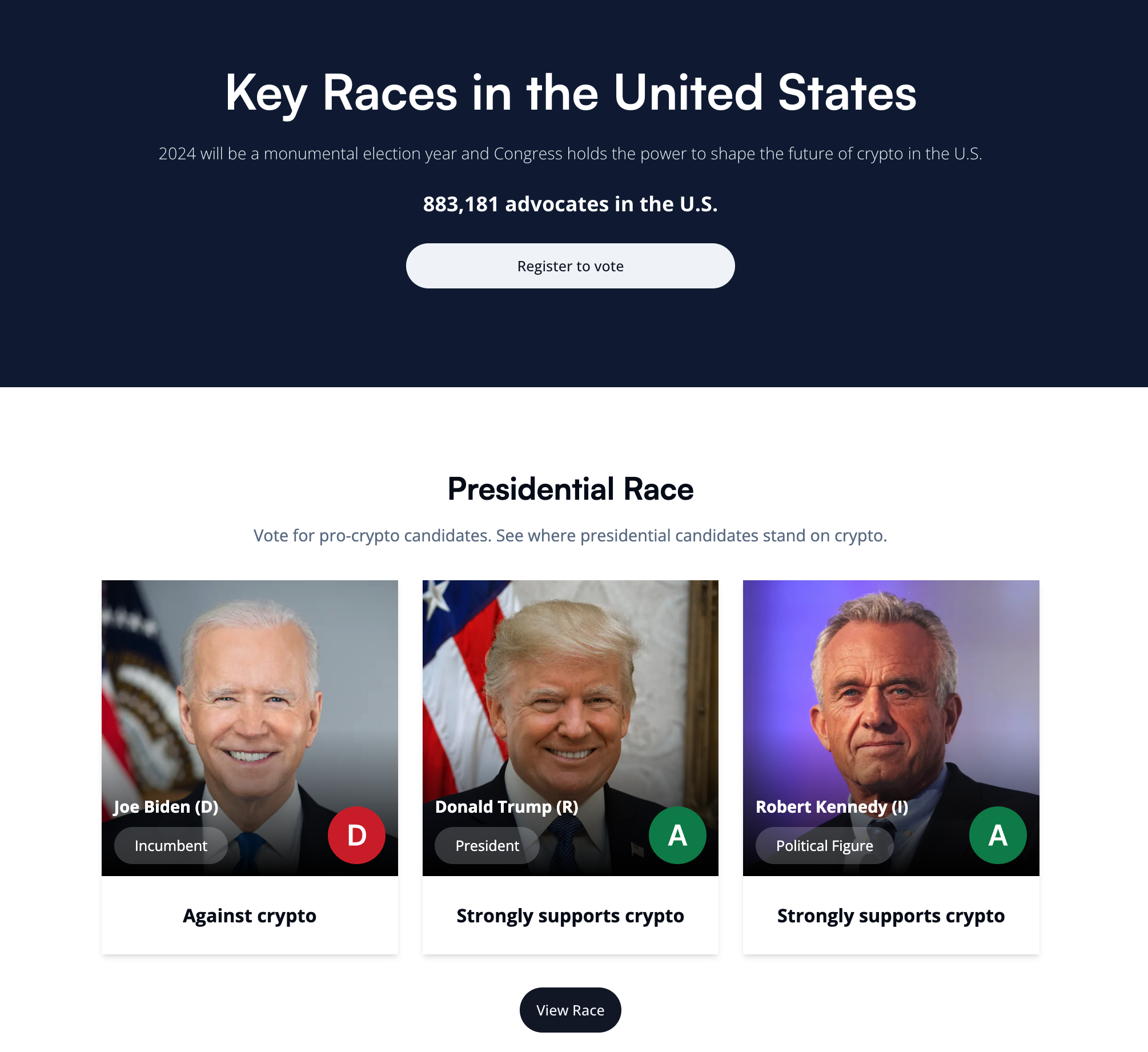
I am one person, and I haven’t got billions of dollars, but I’m going to do my very best.
And if you haven’t already, now would be a great time to support my work, either by signing up for a pay-what-you-want subscription to this newsletter or by making a one-time contribution. This is what I do full-time these days, including these projects like the cryptocurrency spending tracker, and it’s only possible thanks to support from people like you.
Read more
- “Cryptobros United: Crypto Super PACs Amass Over $100 Million for 2024 Elections”, Public Citizen.
- “Cryptocurrency industry lobbying and political contributions skyrocketed in 2022”, OpenSecrets.
Footnotes
Biden himself has made relatively few public statements about cryptocurrency. Much of his stance has to be extrapolated from his March 9, 2022 executive order, which focused on cryptocurrency's risks while also expressing a desire to "support technological advances that promote responsible development and use of digital assets". His administration as a whole has definitely been perceived to be anti-crypto, in large part thanks to a more aggressive stance toward the sector by the SEC, which began after the 2022 collapse. ↩
Cryptocurrency advocates like to take survey results that show that out of samples of people who do hold crypto, many of them are young and/or people of color, and use them to suggest that many young and/or people of color tend to hold crypto. This is not supported by that data. ↩
The parent company of Grayscale Investments (operators of the Grayscale Bitcoin Trust, or GBTC), the now-bankrupt Genesis cryptocurrency lender, and, formerly, the CoinDesk crypto media outlet. ↩
To those tempted to tell me that the US formally adopting crypto would strengthen the economy, please understand just how fringe a position that is. ↩
This seems more of an anecdotal or "common sense" claim — I don't know of any polls that have examined this. ↩
I haven't found much research into how much cryptocurrency people tend to hold as a percentage of their net worth, but there was a 2022 study published by JPMorgan that showed that only around 15% of crypto holders have made net transfers to crypto accounts of one month's income or more. Only 4–6% had transferred three month's income or more.19 Note that this is a percent of a percent: the percentage of people who have ever held, traded, or used cryptocurrency was most recently estimated by Pew at 17%, though they do not provide data on what portion of that 17% currently held crypto.20 ↩
Stand With Crypto was registered with the FEC so recently that they have not yet officially reported any fundraising.21 This number is self-reported on their website. ↩
Fairshake reports contributions monthly, so the most recent Ripple donation has not yet been reflected in the campaign contributions data. ↩
References
"Donald Trump calls Bitcoin 'a scam against the dollar'", BBC. ↩
The Room Where It Happened, John Bolton. ↩
"Trump’s Pro-Crypto Bluster at NFT Gala Lacked Policy Substance", CoinDesk. ↩
"Crypto Attitudes in Swing States", DCG and Harris Poll. ↩
“Crypto is Trump’s new weapon against Biden”, Politico. ↩
"State of the Union 2024: Where Americans stand on the economy, immigration and other key issues", Pew Research Center. ↩
"Swing States Tracking Poll", Morning Consult and Bloomberg. ↩
"Top Organizations Disclosing Donations to Fairshake PAC, 2024", OpenSecrets. ↩
"2024 Outside Spending, by Super PAC", OpenSecrets. ↩
"Top Organizations Disclosing Donations to Defend American Jobs, 2024", OpenSecrets. ↩
"Top Organizations Disclosing Donations to Protect Progress, 2024", OpenSecrets. ↩
"Cryptobros United: Crypto Super PACs Amass Over $100 Million for 2024 Elections", Public Citizen. ↩
“Top Individuals Funding Outside Spending Groups”, OpenSecrets. ↩
“Ripple pumps additional $25 million into pro-crypto super PAC”, The Hill. ↩
"Katie Porter", Stand With Crypto. ↩
"Adam Schiff", Stand With Crypto. ↩
"Steve Garvey", Stand With Crypto. ↩
"1 big thing: Coinbase CEO donates $1 million to super PAC", Axios. ↩
"The Dynamics and Demographics of U.S. Household Crypto-Asset Use", JPMorgan Chase & Co. ↩
"Majority of Americans aren’t confident in the safety and reliability of cryptocurrency", Pew Research Center. ↩
Stand with Crypto Alliance, Inc. Political Action Committee filings. ↩

